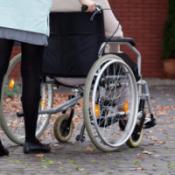 Whether out of obligation or out of a caring heart, more than 65 million adults in the United States take care of an elderly, chronically ill, or disabled loved one. Most of these ailing adults want to continue living at home as they age and their health declines, rather than in an assisted living situation like a nursing home. Because resources are more abundant now for in-home care, “aging in place” has become more common.
Whether out of obligation or out of a caring heart, more than 65 million adults in the United States take care of an elderly, chronically ill, or disabled loved one. Most of these ailing adults want to continue living at home as they age and their health declines, rather than in an assisted living situation like a nursing home. Because resources are more abundant now for in-home care, “aging in place” has become more common.
If you’re a caregiver in this situation, chances are you’re prioritizing care of another person over your own needs. You might be losing sleep and feeling fatigued or distracted. It could be you find yourself losing your temper easily. There’s even a possibility you have lost friends or are facing new financial struggles because of your caregiver role. All of this might leave you experiencing overwhelm.
Is it possible to care too much?
The answer is yes. This “caring too much” can be described as “compassion fatigue.” Compassion fatigue, a stress condition marked by a gradual decline in compassion and empathy toward others, often affects people in professional health care positions. But it can also happen at home when a well-intentioned caregiver overexerts in helping a person with a chronic illness or disability.
Compassion fatigue is different than burnout. When a caregiver is experiencing burnout, they have all but lost the ability to empathize or give care to others. Compassion fatigue happens when we help others who are in stressful situations, and burnout originates from occupational stress and being overworked.
Signs and Symptoms of Compassion Fatigue
Caregivers tend to experience compassion fatigue rather than burnout, although in severe cases, caregivers can experience burnout too. Some signs of compassion fatigue include:
- Apathy
- Increased anxiety
- Changes in sleep (too much or too little)
- Difficulty concentrating
- Physical ailments such as headaches, stomachaches, etc.
- Withdrawal from others
- Reducing or stopping pleasurable activities
- Neglecting one’s own self-care
- Lowered resistance to illness
- Feeling impatient or irritable
Because people in caregiver situations often feel compelled to continue this role, they could be at risk for compassion fatigue. Learning to recognize and manage the signs and symptoms above effectively is imperative if you want to continue caregiving for your loved one. If ignored, these emotions and symptoms can intensify, and can eventually lead to more serious mental and physical issues.
5 Tips for Fighting Off Compassion Fatigue
If you believe you are at risk for compassion fatigue, it is not too late to stop the progression. Here are five tips for self-healing:
- Get enough sleep: You will likely have more energy and sharper thinking when your body is well-rested. This might mean engaging home health care services or a sitter to be with your loved one through the night while you rest. It may help you recharge and feel ready to take on a new day.
- Eat nutritious food: When we’re in a hurry, we tend to eat whatever is easy, and those choices aren’t typically wholesome. Unhealthy food (including drugs and alcohol) can leave us feeling sluggish and bloated, making it a challenge to be active and effective. Meal planning for the week can be a helpful way to stick to a healthier diet. Skipping alcohol and choosing water will likely help cleanse and rejuvenate your body.
- Get moving: While it may seem selfish to take time out of caregiving to exercise, the fact is exercise can boost your immune system, increase the “feel-good” chemicals in your brain to fight off depression, and relieve physical stress. Sparing even 20 minutes a day can be beneficial both physically and mentally.
- Enlist the help of others: Solo caregiving is asking for trouble. It is nearly impossible to care for another person 24/7 without aid. Asking a family member or close friend to take your place for a few hours, or enlisting home health care may give you some respite time to care for yourself. Your support system is crucial to your survival!
- Practice boundary-setting: Know when caregiving is too much and when you need to ask for help. Even if your loved one prefers your care to someone else’s, be aware of your limits and say no when needed. Express your own needs and concerns with others.
If you are on the downward spiral of compassion fatigue, seek the support of a licensed therapist and start caring for yourself, too. As American author and teacher in American Theravada Buddhism Jack Kornfield wrote, “If your compassion does not include yourself, it is incomplete.”
References:
- Signs of caregiver burnout and how to prevent it. (n.d.). Retrieved from https://www.vitas.com/resources/caregiving/signs-of-caregiver-burnout
- What is compassion fatigue? (2013). Retrieved from http://www.compassionfatigue.org/pages/compassionfatigue.html

The preceding article was solely written by the author named above. Any views and opinions expressed are not necessarily shared by GoodTherapy.org. Questions or concerns about the preceding article can be directed to the author or posted as a comment below.

 World Alzheimer’s Month: The Costs of Caregiving for Dementia
World Alzheimer’s Month: The Costs of Caregiving for Dementia A Survival Guide for Caregivers with Depression and Anxiety
A Survival Guide for Caregivers with Depression and Anxiety Life from the Driver’s Seat: When Your Partner Has Epilepsy
Life from the Driver’s Seat: When Your Partner Has Epilepsy

